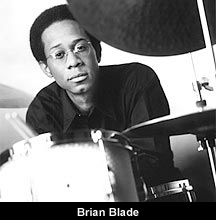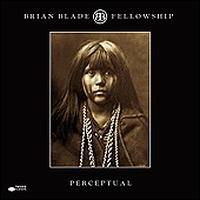

courtesy
of Brian Blade

A
FIRESIDE CHAT WITH BRIAN BLADE
As a son of a Baptist minister, it is easy to connect the dots as to why
Brian Blade is a spiritual man. But if you have listened to his last two
Blue Note albums with his Fellowship, you know he's music is also very
spiritual. If life is a journey, then Blade is certainly on the right
path, both as a man and as a musician. It is always a pleasure to talk
to Brian. I have come away from every conversation with him with a newfound
zeal for life. I just play the interviews each morning while I am in the
shower and that serves as my coffee kick for the day. So here is your
caffeine high. Read it over and over again and the money you save not
entering Starbucks mail to Jazz Weekly, care of the Editor Pension Fund.
Here's Blade, unedited and in his own words.
FRED JUNG: Let's start from the beginning.
BRIAN BLADE: I started playing the drums in church when I was about thirteen.
My brother was a drummer and he's five years old. So he left for college
and everybody sort of turned about and looked at me and said, "OK, now
you play." It was just my part and my role in this situation. Unconsciously
it taught me how to serve whatever the music was to the best of my ability.
If my heart was in it, then great, I could play the drums and inject the
right emotion into the music. I moved to New Orleans when I was sixteen
or seventeen for college and all of the sudden the gates had opened. I
was able to hear so many of my heroes. I met friends, who are my best
friends now, Jon Cowherd and of course we write music for this band of
ours, the Fellowship, and Chris Thomas, who I met when I was in New Orleans
and I was playing with other friends like Nicholas Payton. We were all
just comrades there.
FJ: Why the drums?
BRIAN BLADE: (Laughing) I don't know. The drums, like I say, I don't know
if I consciously chose them, it was more so that they were chosen for
me. In church, it was just my turn after my brother.
FJ: Do you come from a musical family?
BRIAN BLADE: Well, in a way. My father is a great singer. He is a minister
at a Baptist church, at the Zion Baptist Church in Shreveport. My mother
is a kindergarten teacher. There was always a lot of music around the
house and they were always supportive of whatever we were going to do.
FJ: Let's touch on your work with Kenny Garrett.
BRIAN BLADE: Kenny, I never met anyone who was so disciplined to practice
daily, to try and perfect what he does, as far as we can perfect things.
He is so steady. His tone and his music projects that. For me, it was
seeing that and his invitation to come out, like he day after I met him,
he picked me up and we went to his place and played. There was no formality.
It was just an instant friendship. Those things are priceless.
FJ: And Joshua Redman?
BRIAN BLADE: With Joshua, we started playing together with Delfeayo Marsalis
in New Orleans actually. We played together for almost five years on the
road, so needless to say there is also a great bond there. You just can't
replace
that. I just learned from their giving and hopefully, it is reciprocated.
FJ: The members (Christian McBride and Brad Mehldau) of the Joshua Redman
Quartet have had a meteoric rise and you guys weren't even together that
long, a few months.
BRIAN BLADE: Yeah, people converge at different times.
FJ: It was just the right time.
BRIAN BLADE: Sure, absolutely, unfortunately, like you said, Fred, it
was short lived. There is so many gifted musicians that I met that not
any folks get to hear and some will be heard, hopefully sooner than later.
A magical grouping might come together and it might only be brief, but
you catch it when you can.
FJ: Let's talk about the Fellowship. It has a unique instrumentation,
with two guitars and two saxophones.
BRIAN BLADE: Since Jon and I met in school, ten years ago now, maybe more,
I don't know, there was always this idea that we should put a group together
and play, play our music. Jon was already writing. I hadn't begun to write
until about five or four years ago, maybe less. For me, it was the sound
of each individual voice that are in the band. Melvin Butler at the tenor
and soprano and Myron Walden at the alto and bass clarinet. Dave and Chris
and Kurt, they all inject a certain feeling with their sounds. So for
me, it was quite important that I wrote for those people specifically.
That is what the band for me is about, that little community of seven.
I have to have it thick and thin like that. Sometimes it may just be myself
and Chris and Myron playing or just Jon playing or all of us. I like the
polyphonic possibilities.
FJ: You have an affinity towards the large ensemble when the norm is to
debut with a quartet or trio record.
BRIAN BLADE: Absolutely, Blue Note has been in our corner. It is difficult
touring with seven people. For me, I have no vision of a trio or quartet
or playing any other music at this time than what we are playing now and
trying to compose for it, but that may change sometime later down the
road. In terms of the band, for me, that is the dream, that sound that
we make. Anything else, I don't know.
FJ: On your latest, Perceptual, you play guitar on a couple of tracks,
is this something you may want to continue to explore?
BRIAN BLADE: Yeah, live, of course, I will just be behind the drums, but
on records, maybe. I don't know how that will unfold. Writing, sometimes,
they start with these very short lyrical ideas, very short stories that
are just an experience or an emotion that I might have seen.
FJ: Talking about the cover of your latest album, the black and white
of the Mohave girl, you refer to us all as being connected.
BRIAN BLADE: For me, it's the whole idea of variations of a bloodline.
I have to think that somewhere way back at the very beginning of the human
coil, we came from this spark and that truly, our differences can't possibly
outweigh our similarities as human beings. We all want laughter. We all
want love. We all want a place to be, even if we are wandering. We all
need each other. I think just by that, we are links on a chain. It is
more on a spiritual plain, not so much things on this level, things that
go beyond one lifetime.
FJ: So do you see color lines?
BRIAN BLADE: Absolutely not. For me, it is important that those hatchets
are buried. Unfortunately, whether it is land or color or faith, whatever
the things are that separate us, I think people just need to, I don't
know, Fred. I don't know how to solve these problems. Maybe they will
always exist. For me, in my little world, I am thinking, "We're brothers.
We are in it together." Well, I thought. Idealism is often not realism.
FJ: The name of your group, Fellowship, as well as your close association
with Joni Mitchell speaks volumes about your selflessness.
BRIAN BLADE: I feel as though I really don't know that many people so,
I don't know if that many people know me (laughing), maybe two. For me,
I just want the music to reach people and I know that it will. The people
who need it and want to be touched by it or that are supposed to be, will
be. The idea of Brian Blade is secondary to the big picture. As an artist
you have a lot of responsibilities. I think there has to be social commentary
in the music. You have to think of yourself as a healer and try and reach
out and touch folks.
FJ: Does the world need healing?
BRIAN BLADE: Oh, absolutely, especially in this country. We have so many
problems that we create on our own. Kids and guns for one thing. I mean,
that has got to stop. It is so out of hand in terms of the moral code.
We have lost our way a little bit.
FJ: Last week, a young six-year-old brought a gun to school and shot a
classmate.
BRIAN BLADE: What is that, Fred? That is so ridiculous. You can't fathom,
"OK, how does someone that is six get a weapon like that or take a life
at that age?" It is hard to understand.
FJ: How has being around Joni Mitchell helped your growth as a human being
and as a musician?
BRIAN BLADE: It was more rewarding than I would have ever imagined. It
is so great when you admire someone and then to meet them, "Wow!" They
are so open to you. We speak often. She is just a brilliant individual.
I have never met anyone like her and you kind of sense that in her music.
She is a dreamer and also grounded in her thinking. She is such a joy
to talk to. When you are writing sometimes, you are thinking, "No one
is hearing this. This is just selfish." I try and keep hope.
FJ: Is that hope your motivation?
BRIAN BLADE: Absolutely, that feeling when you are playing for people
and everything is congealed. You have a gift to do what you do. To leave
people a little bit of joy.
FJ: And the future?
BRIAN BLADE: I want to make a record that is more directly from my roots
growing up in Zion. For me, I think we just made two sacred records. It
depends what you are offering it up to. What does the music mean to you?
If it is sacred to you, then you call it that. It doesn't exclude anyone.
I think we all have to have something to put our heart into. For me, it
is that and I don't think there is anything more sacred than that.
Fred Jung is the Editor-In-Chief. He is also the interview capital of
the world. Comments? Email
Fred.